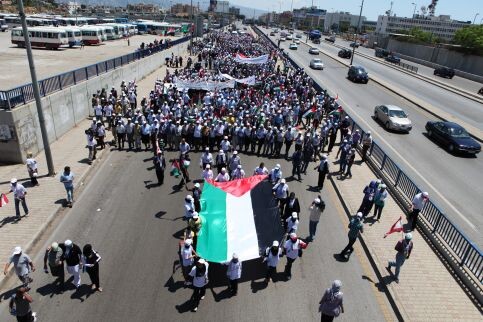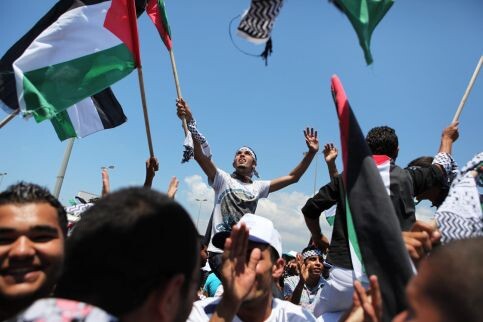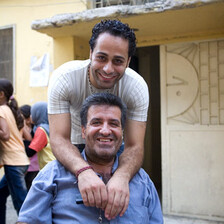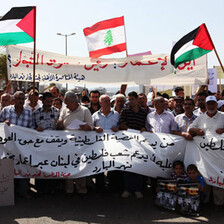The Electronic Intifada 29 June 2010

Demonstrators calling for Palestinian human rights in Lebanon march from south Beirut to downtown. (Matthew Cassel)
As cars plastered with the flags of Brazil, Germany, Argentina and other favorite World Cup teams drove across Beirut on Sunday, Palestinian refugees and their supporters carried Palestinian and Lebanese flags as they marched through the capital. They called for their human rights in Lebanon, where they have lived without them for more than six decades.
Closing off some of Beirut’s main roads, thousands of demonstrators marched to revolutionary Arabic music carrying signs and chanting slogans like “we want our civil rights,” and “we will never forget the right of return.”
Milad Salameh, coordinator of Palestinian Youth Organization in the Nahr al-Bared refugee camp, explained “We came to march because it’s important for Palestinians in Nahr al-Bared and elsewhere in Lebanon to take our rights. We can study and finish university, but we can’t work. After 62 years we have to take our protest outside the camps to show the Lebanese people and the government what we want and what we need.”
The Nahr al-Bared refugee camp, Lebanon’s second largest Palestinian camp, was destroyed in 2007 during fighting between the Lebanese army and militants from Fatah al-Islam, a shadowy organization with fighters from across the region. The camp remains in ruins and under a tight army blockade that greatly restricts the movement of people and goods into the camp. It highlights the struggle for many Palestinian refugees in the country who increasingly fear that other refugee camps could soon follow the “Nahr al-Bared model.”
Salameh added “Usually when we demonstrate it’s against the war in Gaza or the war in Palestine. This march is important because it’s the first time that we demonstrate specifically for Palestinians in Lebanon.”
Lebanon currently hosts more than 400,000 Palestinian refugees who were expelled or fled from Palestine during the 1948 Nakba, when Zionist forces ethnically cleansed Palestine and founded the state of Israel. The UN General Assembly passed Resolution 194 in December 1948 which called for the right of return for Palestinian refugees and their descendants and compensation for their losses. Today the Palestinian refugee population is the oldest and largest refugee population in the world, numbering more than six million.

Demonstrators chant: “We will never forget the right of return.” (Matthew Cassel)
In Lebanon, Palestinian refugees have lived under discriminatory laws that deny them most basic civil rights. They are not allowed to work in more than 20 white collar professions, including medicine, law and engineering. Meanwhile, blue collar jobs require that Palestinians obtain work permits that must be renewed annually or if a worker changes employers. They are unable to own property and they are excluded from most social services offered by the state, even though they must pay social security fees to the Lebanese government in order to obtain a work permit. Large numbers of Palestinian refugees can also be found in nearby Syria and Jordan where they also face various forms of discrimination, although most human rights organizations have declared that the situation in Lebanon is the worst.
Sunday’s march, which was held under the slogan “We want to live in dignity in order to return,” was endorsed by more than 100 Palestinian, Lebanese and international non-governmental organizations in Lebanon. Buses brought Palestinians from the 12 refugee camps located across the country to two locations in Beirut where they marched separately across the city, coming together downtown. Organizers of the march originally planned to converge outside the Lebanese parliament, but after being denied a permit by the authorities they instead gathered outside the United Nations headquarters located nearby.
Rola Badran, organizer and Program Director of the Palestinian Human Rights Organization, explained that “The point of this event is to show Palestinians that we cannot stay waiting in the camps. We have to march and call for our rights.”
Badran said that the march was part of ongoing campaign to put pressure not only on the Lebanese government, but also on the international community to recognize the Palestinian refugees’ right of return.
The issue of granting rights to Palestinians refugees has always been controversial in Lebanon due to the uneasy sectarian balance established in the country’s constitution. Christian politicians recently rejected four draft laws in the Lebanese Parliament that would have granted Palestinians the right to work and own property. Christian groups insist that respecting Palestinians’ basic rights would lead to their naturalization as Lebanese citizens and tilt the sectarian balance in favor of Sunni Muslims. Palestinian groups have long refuted this, and state that it isn’t Lebanese citizenship they want, only their human rights and to return to Palestine.
“We’re not Sunni Palestinians, we are Palestinians,” Badran said. “We are humans, we are here, we need to enjoy our dignity. That is the first step to go back to Palestine.”
Matthew Cassel is an independent journalist and photographer based in the Middle East.





